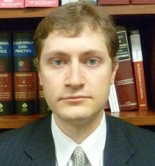
State: Calif.
Grinberg: WCAB Rejects AME's Apportionment Analysis: [2023-03-30]
Nothing ruins my day more than reading about yet another apportionment finding by a medical evaluator being rejected by the Workers' Compensation Appeals Board.

Gregory Grinberg
The case is that of Monter v. Randstad North America Inc., a WCAB panel decision. The parties proceeded to trial based on the opinion of an agreed medical evaluator who found 50% apportionment to nonindustrial factors. The AME opined that “50% of the impairment/disability is due to factors before the industrial injury such as lumbarization of the first sacral segment.”
On appeal, applicant argued that the opinion on apportionment was not substantial medical evidence and sought a finding of 14% PD instead.
The WCAB granted reconsideration and substituted a finding of 14% as sought by applicant. The reasoning given was that the AME did not “explain the nature of those factors,” “did not explain how and why those factors were causing permanent disability at the time of the evaluation” or “how and why those factors are responsible for 50% of applicant’s disability.”
There is nothing new or groundbreaking in the notion that proving apportionment, especially under Labor Code Section 4663, is defendant’s burden. However, the AME did point out the cause of the permanent disability and, more importantly, this is an AME. An AME’s opinions are typically given significant weight, but not in this case.
Let us be reminded then, as the Monter panel points out, what we need to elicit to support an opinion on apportionment:
- Specifically discuss the factors causing permanent disability, particularly those other than the current industrial injury.
- Explain how and why those factors caused permanent disability.
- Explain why those factors are responsible for the percentage assigned by the medical-legal evaluator.
A helpful reminder for all of us, no doubt.
Gregory Grinberg is managing partner of Gale, Sutow & Associates’ S.F. Bay South office and a certified specialist in workers’ compensation law. This post is reprinted with permission from Grinberg’s WCDefenseCA blog.